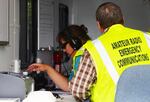
Members of the Oregon Office of Emergency Management's Amateur Radio unit conducting a statewide Simulated Emergency Test using High Frequency Radio in the OEM's Continuity of Operations Trailer.
Courtesy of the Oregon Office of Emergency Management
In the last 100 years, there have only been five magnitude 9.0 or higher "megaquakes" worldwide. The pressure currently building in the Cascadia Subduction Zone that runs along the California, Oregon, and Washington coasts could unleash a sixth.
To prepare for the disaster, this Saturday the Oregon Office of Emergency Management is supporting the largest statewide emergency communications exercise Oregon has ever had. About 200 amateur radio operators will participate, and according to Cory Grogan, a public information officer at OEM, these operators could serve a vital role in affected areas when – not if – the earthquake strikes.
"Basically any form of communication likely will be down," Grogan said. "Amateur radio is going to be the only form of communication that we'll have available at that point."
Vince Van Der Hyde is one of those amateur radio operators. OPB All Things Considered host Kate Davidson decided to call him up to talk about how he plans to help when disaster strikes. The following responses have been edited for clarity.
Kate Davidson: How long have you been into Ham Radio?
Vince Van Der Hyde: I've been an amateur radio operator since 1959, at the age of 17. Even before that, in the early '50s we had the first Sputnik come up, and I listened to that as it beeped, beeped its way in orbit. That really struck my fascination.
KD: Do you have a station set up at home?
VDH: Oh yes, I have a station. I live off of Salem a little ways. I found a place with a nice hill. My sons helped me put up a 70-foot radio tower with currently 12 or 15 antennas.
KD: If a major earthquake and tsunami hit, what would happen step-by-step with these amateur radio operators? What would they do?
VDH: As soon as the ground stops shaking, they would gather and report at the county emergency operations center for assignment to different kinds of tasks. Some of those tasks are to communicate from the county government to the state government, some of them are to support organizations like the Red Cross and the Salvation Army.
You have to look at what damage assessment has taken place, what condition roads and bridges are in, what kind of rescue operations, who needs gasoline, who needs water, where are people sheltered. All that information has to come into the state government.
KD: How important is it to have shortwave radio operators available to mobilize in an event like this?
VDH: Let me put it like this: One of the conditions of having an amateur radio license, which we're granted by the Federal Communications Commission, is that we have an obligation as a holder of those licenses to provide emergency communications to the citizens. So, it's really a tradition in the amateur radio field to help in anyway that we can with those kinds of communications.